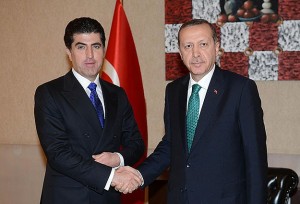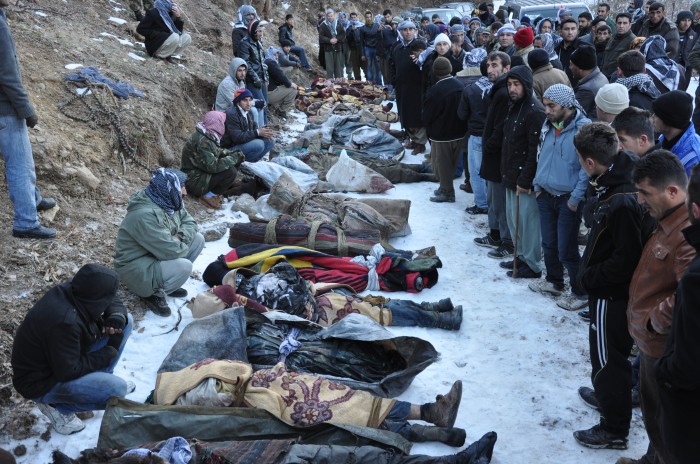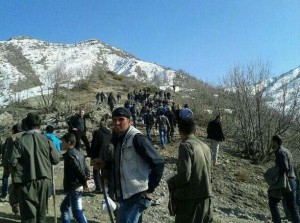By Dr. Amy L. Beam (Mount Ararat Trek):
Smuggling is, legally speaking, the exportation and importation of goods across borders without paying government taxes. For those who believe their activities are legal, theirs is an import/export business. The terms are applied selectively to influence perception of the event, like the terms terrorist and anti-terrorist. The former term is pejorative representing the “bad guys,” while the latter term is government-approved, giving license to the “good guys” to engage in their own form of State-sponsored terrorism. Smuggling is one of those words that conjures up images of cocaine cartel overlords.
BasNews reported this week that Kurdistan’s Prime Minister Barzani and Turkish PM Recep Tayyip Erdoğan had secretly reached an agreement on Kurdish oil exports that will be implemented if Iraqi Prime Minister Nouri al-Maliki remains opposed to Kurdish oil exports to Turkey.
It was also reported that both the Kurdish and Turkish Prime Ministers agreed that, if Maliki does not agree soon, they will start exporting Kurdish oil to Turkey within the next two months. The oil can then potentially be sold to multinational oil companies who have signed contracts with the Kurdistan Regional Government (KRG), including US-based Chevron, Exxon and Marathon. The two pipelines from Kurdistan to Turkey are completed and oil is said to be flowing through one.
Baghdad has opposed the deal because the pipelines circumvent Baghdad’s metering system intended for central government revenue sharing and taxation. To force Erbil to concede control over revenues to the federal government, Baghdad has frozen the KRG’s monthly deposits from the national budget, which go to pay for things like government salaries.
Iraq’s oil minister, Abdul Kareem Luaibi, said on January 17, 2014, that Iraq will take legal and other measures to punish Turkey and Iraqi Kurdistan, as well as foreign companies, for any involvement in Kurdish exports of smuggled oil without Baghdad’s consent. Turkey has been saying it sides with a peaceful solution to be reached by Baghdad and Erbil.
In the same week that Turkey was having a stand-off with Baghdad over importing oil, Turkey’s military was having a stand-off in the mountains of Uludere with families of the Roboski massacre victims who were killed while importing 150 liters each of petrol in their saddle bags.
It is more than two years since Turkey’s military bombed and killed 34 innocent civilians at the border between Roboski, Turkey and Kurdistan (KRG), Iraq. In 2013, the government called it an operational mistake, but did not answer the families’ demands to reveal who provided the intelligence and ordered the F-16 bombing on December 28, 2011. The victims were mostly teenaged boys returning home on their mules after purchasing petrol from their cousins just over the mountain ridge behind their houses.
The Turkish government labels these Kurdish traders as smugglers and has persisted in house raids and prosecutions against them for speaking out about the massacre. Families in Gülyazı and Roboski say they have been importing from Kurdistan for generations with full knowledge of the government. They do not recognize the border. The mountain ridge is in their back yards. They pass through their ancestral nomad grazing land to trade with their own relatives a few kilometers away in Kurdistan, Iraq, and return the same day to earn 100 to 150 lire ($45-$70 USD).
Survivor Servet Encu says: “Trading is our main activity. We do it to survive. I have six children to feed. We risk our lives for bread and butter.”
In Turkey, petrol sells for nearly 5 lire ($2.25 USD) per liter at the pump, but 3.50 lire ($1.58 USD) per liter if purchased in small 20-litre containers in border towns in eastern Turkey. This “smuggled” petrol is sold openly in full view of government officials who also fill up their cars with the less expensive fuel.
On February 25, 2014, once again, there was military action at the Turkey-Iraq border near Roboski. The Turkish government has built a “security road” and erected a wire fence to block the cross-border trading. This has drawn local protests which resulted this week in military bombing, shooting and tear gassing of civilians.
After 1000 local villagers walked to the border to intervene as human shields between the Turkish army and HPG (People’s Defense Units), both sides retreated. If the border is permanently closed, these villagers will lose their main source of economic survival.
In a typical day, not more than 50 barrels of petrol can be brought by boys and their fathers on their mules. Compare this to the 400,000 barrels of oil per day scheduled to be pumped from Kurdistan to Turkey each and every day for the next 15 years. It would take 100 men 22 years . . . yes, years . . . working every day, to import on their mules the amount of oil that Kurdistan has promised to pipe to Turkey in just one day.
Bombing and persecuting people living in poverty is counter-productive to the fading Imrali peace process. What purpose does it serve other than to fuel the fire of resistance in every Kurd’s heart? To force the villagers of Gülyazı and Roboski to abandon their homes and migrate west or starve is a continuation of the policy of forced evacuation of 4,000 Kurdish villages in the 1990s.
One Roboski mother who lost her son on December 28, 2011, asks: “Who is the biggest smuggler? Our boys who ride their mules to earn 100 lire or politicians who hide shoeboxes of money in their houses?”
It is ironic that Turkey encourages the Kurds in Kurdistan to by-pass government taxation, but prohibits its own Kurdish citizens in Gülyazı and Roboski from doing the same. The false dichotomy between good Kurds and bad Kurds and the determination to separate them persists. The language of smuggling is all about persecution, perception, and power.
It might help PM Erdogan’s precarious position if he would apply the same “peaceful solution” process to Roboski as he does to the Kurdistan-Baghdad disagreement. The road to peace in Turkey must include Roboski.
Copyright © 2014 Kurdistantribune.com
.jpg)







[…] measures to circumvent this tax, such as building a gas pipeline between northern Iraq and Turkey to bypass Iraq’s metering system to track oil […]